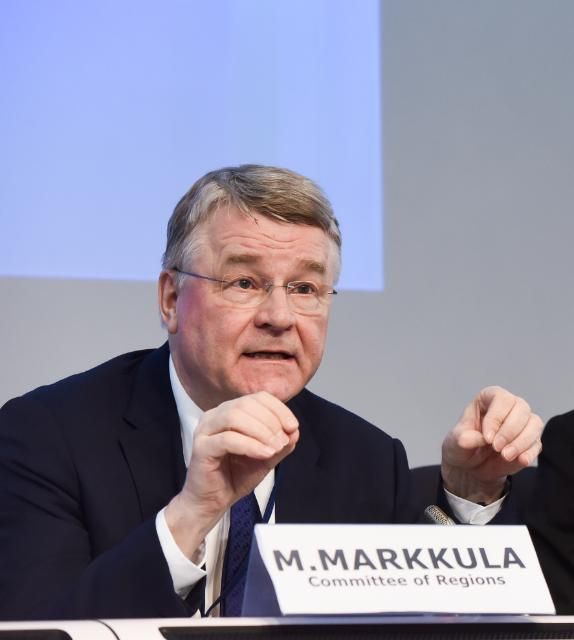EU Regions and cities start building an Alliance for the Future of Cohesion Policy
 In view of future negotiations of the EU budget, the European Committee of the Regions join forces with territorial associations and call all relevant actors at EU, national, regional and local level to build an Alliance for a strong and ambitious cohesion policy after 2020.
In view of future negotiations of the EU budget, the European Committee of the Regions join forces with territorial associations and call all relevant actors at EU, national, regional and local level to build an Alliance for a strong and ambitious cohesion policy after 2020.
New emerging priorities such as defence, security and border control, and the impact of Brexit on the EU budget risk jeopardising the future of the most powerful investment policy for the 27, worth euros454bn until 2020. This is why at the CoR, today, the idea of a new open alliance was launched.
The aim of the Alliance is to cast light on the added value and effectiveness of cohesion policy over the last decade, ensuring that decisions on the next EU budget take into account the voice of hundreds of thousands of beneficiaries from regional and local authorities, SMEs, NGOs, schools, universities, cultural organisations, etc.
Following the recent adoption of its opinion on "The Future of Cohesion Policy beyond 2020" and in view of the forthcoming 7th Cohesion Forum at the end of June, the Committee opened, together with leading territorial associations, a realistic debate which aims to directly address some of the criticisms raised against cohesion policy, while intensifying collaboration among all supporters.
" Cohesion policy is not a charity, is an obligation. EU citizens in our regions and cities need it to be stronger, easier and more effective. This why, after adopting our opinion we work on a wide Alliance for a strong Cohesion Policy post 2020 ", said CoR rapporteur Michael Schneider, State Secretary of Saxony-Anhalt and President of the CoR's EPP Group, adding that: " This is no PR stunt but a wide mobilisation open to cities, regions, territorial associations, central governments, EU institutions, universities, SMEs and civil society".
" Investments through cohesion policy have helped to make our cities more liveable and inclusive " said Daniël Termont, mayor of Ghent and president of EUROCITIES, stressing that: " It is a strong expression of European solidarity and has great potential to show the benefits of Europe to our citizens. For a stronger policy in the future, we need to see cities directly involved in strategic investment decisions related to the structural funds. This is vital to ensure that funding matches local needs, to strengthen local ownership and make the implementation of funding more efficient. "
On behalf of the Council of European Municipalities and Regions (CEMR), Carola Gunnarsson, Mayor of Sala, and spokesperson on cohesion policy, pointed out that: " Cohesion policy is an instrument that demonstrates to the people that the EU cares about them and that all levels of government can team up to tackle current challenges. Giving up cohesion policy would mean the EU would deprive the European project of much of its substance. Through this alliance, mayors and regional leaders want to keep a strong cohesion policy that is able to respond to our citizens' needs. "
The Conference of Peripheral Maritime Regions of Europe (CPMR) was represented by Erik Bergkvist, President of the Regional Executive Committee of Västerbotten (SE), who said: " Europe's territories face different challenges, including geographic, environmental and social constraints, and there cannot be a one-size-fits-all European solution. This is why a Cohesion policy with a stronger territorial dimension is needed to achieve EU objectives of economic, social and territorial cohesion and to stimulate growth. We need a Cohesion policy based on a better recognition of Europe's territorial diversity, greater flexibility for certain geographical regions, a place-based approach, and synergies between different levels of governance. Only then can Cohesion policy release the potential of all European regions. "
"There is a growing movement of engagement needed in favour of cohesion policy coming from nearly every member states", said CoR President, Markku Markkula, inviting relevant stakeholders to join forces: " As the tough future EU budget negotiations commence, our Committee is ready to bring these voices to be heard in Brussels. This is why we want an alliance in favour of cohesion open to all those who believe in EU fundamental values like solidarity and partnership. "
For more information:
Infographic on the CoR opinion the future of Cohesion Policy
CoR studies on the future of Cohesion Policy
Evaluations of the 2007-2013 programming period
EU Cohesion policy open data portal
President Markkula statement on the 25 April General Affairs Council on Cohesion
European Parliament REGI Committee resolution on Cohesion Policy post 2020
EUROCITIES statement on the future cohesion policy
A new Policy paper will be published ahead of the 7th Cohesion Forum.
Council of European Municipalities and Regions position papers on cohesion policy
Conference of Peripheral Maritime Regions of Europe (CPMR) Position on the Principles for Cohesion Policy post 2020 .
A Policy Paper on the Future of Cohesion Policy will be formally adopted at the Political Bureau in Stavanger in June 2017.
Contact:
Pierluigi Boda
Tel: +32 2 282 2461
Mobile: +32 473 85 17 43
pierluigi.boda@cor.europa.eu